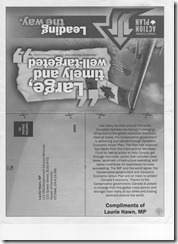There will be at least one Albertan in Copenhagen fighting for real reductions in emissions from world leaders, and she’s posting her daily updates to a website for you to follow.
This is great for Linda Duncan and it comes on the heels of the news that Bill C-311 has finally passed the committee that the majority of Liberals needlessly sent it to a few months ago.
Copied below is her most recent e-newsletter that outlines the work she has been doing in Edmonton-Strathcona that may have been unnoticed compared to some who would seek to upstage her. Note how this is neither a wasteful 10%er nor a hyper-partisan attack ad.
December 2009
Newsletter from Linda Duncan, M.P.
Dear Friends,
As the holidays are almost upon us I wish to take this opportunity to wish you all the best of the season and share a few highlights from my work on the Hill. It may be an understatement to say it has been a very hectic Fall Session. We have celebrated some successes, but also some frustrations in our efforts to address the dual challenges Canada faces taking action for the economy and for the planet. I have provided brief updates on just some of some of our initiatives. We are doing our best to help you track my efforts and those of my colleagues in the federal New Democrat caucus through my web site www.lindaduncan.ndp.ca and my newsletters.
Climate Change and Environment
As the NDP Environment Critic, I have been fighting to get our bill, Bill C-311, An Act to ensure Canada assumes its responsibilities in preventing dangerous climate change to the final vote in the House of Commons before Copenhagen. Bill 311 would impose binding science-based targets for reduction of greenhouse gases and hold the government publicly accountable for taking concrete measures to comply.
Regrettably, 67 of 77 Liberals voted with the Conservatives to delay the final vote leaving the Bill languishing in Standing Committee hearings. (Testimony of the witnesses can be accessed via my website.) As a result the only message from Parliament to the international negotiation tables will be the same regressive position of the Harper government. Most other nations now view Canada as an impediment to success rather than a leader for change. Rajendra Pachauri, head of United Nations Intergovernmental Panel on Climate Change, has said, “In the last couple of years, I’m afraid, Canada has not been seen as sitting at the table. I think Canada should be doing much more.” But the pressure on Canada mounts and I will continue to dialogue with other governments.
In December, I will be going to Copenhagen for the talks. I will be posting a daily report on my website www.climatecountdown.ca. I encourage you to contact me with your views and actions so that we may post them.
I recently introduced a private member’s bill to establish a Canadian Environmental Bill of Rights, Bill C-469, which outlines the Government of Canada’s obligations to protect our rights to a healthy and ecologically balanced environment. If you would like a copy, please contact my office: 780-495-8404.
Fair, Sustainable Trade
The Government’s indifference to the environment is also apparent in their international policies. In June, for example, we debated the Canada-Peru trade agreement. In my speech, I said, “Instead of strengthening the environmental provisions of our trade agreements, we are moving to water them down further. Despite the weaknesses of the North American Agreement on Environmental Cooperation, NAAEC, recommendation after recommendation to strengthen that agreement went in the opposite direction. The government has chosen to further downgrade any responsibilities for environmental protection either on this country or on the countries with which it signs trade agreements.” You can find the rest of this speech and others at www.lindaduncan.ndp.ca/news.
In November, we again debated the Canada-Colombia Free Trade Deal and I noted: “Every time we raise concerns about the government’s failure to act on environmental protection measures and climate change, it speaks of balance, and yet this agreement and the side agreement on the environment has severely pared back any environmental conditions as found in the agreement that we have with Mexico and the United States.”
Pensions
We tabled a series of bills and motions to implement a comprehensive plan designed to place Canada’s retirement income system on a more secure and equitable footing. A number of the motions received all party support. Many of the bills are in Committee.
Some of those measures include:
· Eliminating seniors’ poverty by increasing the income-tested Guaranteed Income Supplement (GIS) by $700 million a year. Since the majority of poor seniors are women, this is also the equitable thing to do. We will pay for this by cancelling $700 million from the Conservative’s next planned corporate tax cut, due in January.
· Working with the provinces to phase-in a doubling of CPP benefits (from about $11,000/yr. to almost $22,000/yr.), thus giving Canadians the chance to save in the least expensive, most secure, inflation-proof, retirement savings vehicle. Cost? An additional 2.5% of wages (matched by employers.
· Security for workplace pension plans through (a) a mandatory national pension insurance plan, paid for by pension plan sponsors and guaranteeing pension pay-outs of up to $2,500/month, and (b) a national facility, managed (with provincial agreement) by the CPP Investment Board, to adopt pension plans of failed companies and continue them on a going-concern basis to take advantage of market conditions and maximize pay-outs.
· A public National Pensions Summit, with representation from all interested parties -federal/provincial/territorial governments, employers, workers, seniors and experts – to consider these and other proposals for addressing the national pensions crisis.
Child care
Twenty years ago, on November 24, the Leader of Canada’s New Democrats, Ed Broadbent, sounded the alarm bell on the tragedy of child poverty in Canada. Since then, New Democrats have been pushing for action. Tony Martin, M.P. for Sault Ste Marie, campaigned to bring the House of Commons HUMA Committee poverty hearings to Edmonton. They took place on December 3 and my office worked with anti-poverty groups across the city to make sure they had the chance to testify.
Quality child care is a vital part of ensuring get a good start in life. Olivia Chow has reintroduced our Early Learning and Child Care Act and you can find out more at her website www.oliviachow.ca.
Employment insurance
One of the major failures in the current economic crisis is that we have not properly protected all those who were thrown out of work. New Democrat bills and motions have sought to enable more unemployed Canadians to get Employment Insurance coverage and to get it sooner. www.chrischarlton.ca/news/labour.
Protection for consumers
My colleague Brian Masse scored a major victory when a motion fully supporting the goals of his Right-to-Repair Bill (C-273) passed unanimously in the House of Commons. Brian’s bill dealt with the issue of on board diagnostic capabilities, which are contained in approximately 59 per cent of vehicles on the road in Canada. The use of computer control units is essential for proper vehicle maintenance. Difficulty in obtaining this equipment from vehicle manufacturers has created significant consumer concern and competitive barriers. Bill C-273 resolves these issues and guarantees a level playing field. Canadians will be able to choose whether to have maintenance done by a manufacturer’s official dealer or an independent repair shop.
Jim Maloway, New Democrat M.P. for Elmwood-Transcona, was less fortunate in his attempt to bring in a bill of rights for airline passengers. The Bloc Quebecois joined the Conservatives in trying to defeat his bill. The Edmonton Journal ran an editorial on this on November 25. In Don’t ground passenger rights, the Journal noted: “The facts are that Bill C-310 is a perfectly reasonable piece of legislation patterned after the European Union’s passenger bill of rights, which has been in force for five years without a hitch.”
Similarly, the Government has failed to act on the motion put forward by New Democrat consumer affairs critic, Glenn Thibeault, calling for comprehensive credit card legislation. Glenn’s motion was passed by a majority of M.P.s, but the Finance Minister’s response of voluntary regulations have completely failed to protect consumers and small and medium-sized businesses.
Post-secondary education
Like many of you, I am deeply concerned that the financial problems being experienced by the University of Alberta and other post-secondary institutions will mean even higher fees for students, who are already struggling financially. It is very difficult to find time to study properly when you have to take on two or three part time jobs. According to the 2009 Statistics Canada report on university tuition fees released this morning average tuition fees for undergraduate students rose this year by 3.6 per cent despite the Consumer Price Index (CPI) dropping 0.8 per cent. Graduate students fared worse, facing an increase of close to 5 per cent.
Niki Ashton, New Democrat post-secondary critic is proposing a Post-Secondary Education Act. Similar to the Canada Health Act, it will guarantee that every federal dollar spent on PSE goes towards building an accessible high-quality post-secondary education system across the country. I welcome input from students on how high tuition fees are affecting their education. Please contact me: [email protected].
Justice
We have been overwhelmed this fall responding to a litany of “crime” bills mostly tabled as private member bills by Conservative back benchers. This practice has the very undemocratic result of reducing opportunity for debate. In most cases, no factual basis is offered for the measure. There appears to be a clear policy of reducing judicial discretion. We have agreed to send some of the bills to Committee in hope of improvement and in other instances opposed the reform as unnecessary. We have made constant requests for more resources to prevent crime through increased support to police, RCMP, prosecutors and community prevention programs. I based my vote to maintain the gun registry on the advice of Edmonton’s police chief and officers across Canada who believe it remains a valuable crime intervention tool.
In the riding
I attended the Edmonton Federation of 2009 Volunteer Recognition Gala on November 13th. Volunteers from Ottewell, McKernan, Argyll, Empire Park and Bonnie Doon were all recognized as heroes of their communities for their extraordinary contributions.
In early November, Strathcona Community League received a plaque from the Edmonton Historical Board.
There have been a wide variety of other events in our riding, from Remembrance Day in the Butterdome to Make Poverty History in the University Quad, which was once again a tribute to the dedication and idealism of the young people who organized it.
I would like to thank McKernan, Queen Alexandra, Hazeldean and Mill Creek Schools, who all invited me to come and read to them during Read-In Week. I was pleased to speak to classes both at University of Alberta and King’s University College. I would also like to congratulate the students at King’s who organized, with Amnesty International, a rally about Omar Khadr.
Our arts community continues to flourish, with excellent plays at local theatres this fall. I was very pleased to see that Maria Dunn was nominated for Solo Artist of the Year at the Canadian Folk Music Awards.
Please contact my office with questions, requests and concerns. You can also visit my websites:
www.lindaduncan.ndp.ca
www.climatecountdown.ca
You can also join me on Facebook or follow me on Twitter.
As it is the time of year when we tend to do extra shopping, I would like to encourage you to support our local businesses! I wish you and your families all the very best for the holiday season and the New Year.
Linda Duncan, M.P.
Edmonton-Strathcona
10049 81 Ave
Edmonton, AB, T6E 1W7
780-495-8404






